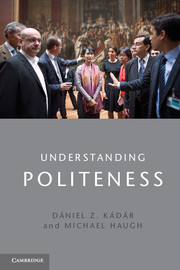Book contents
- Frontmatter
- Contents
- List of figures
- List of tables
- Foreword
- Acknowledgements
- 1 Introduction
- Part I Theoretical framework
- Part II Politeness and time
- Part III Politeness and social space: from mind to society
- 9 Politeness and metapragmatics
- 10 Politeness, cognition and emotion
- 11 Culture, identity and politeness
- 12 Conclusion
- Notes
- Glossary
- References
- Index
11 - Culture, identity and politeness
Published online by Cambridge University Press: 05 June 2014
- Frontmatter
- Contents
- List of figures
- List of tables
- Foreword
- Acknowledgements
- 1 Introduction
- Part I Theoretical framework
- Part II Politeness and time
- Part III Politeness and social space: from mind to society
- 9 Politeness and metapragmatics
- 10 Politeness, cognition and emotion
- 11 Culture, identity and politeness
- 12 Conclusion
- Notes
- Glossary
- References
- Index
Summary
Introduction
For many, being polite is regarded as an important symbol of human culture. According to some, what distinguishes humans from other beings is that they can act in a ‘civilised’ way, by expressing politeness in different forms towards fellow humans. Within human civilisation, politeness is often regarded as a benchmark of civility, where a ‘proper’ command of politeness represents a certain type and level of culture, and so, politeness is claimed to distinguish certain individuals from others. The present chapter will not comment on the first point: opinions may differ across disciplines such as sociology, anthropology and ethnology as to whether politeness in the sense of relationality is a solely human property, even if there is no doubt that the abstract phenomenon of linguistic politeness is an absolutely human phenomenon. We will, however, consider in some detail the second point, by claiming that a treatment of politeness as a ruling norm, which is commanded by some and not by others, is an inherently biased and ideologically charged one: the association of politeness with ‘standard’ norms only reflects the view of the powerful classes and groups within a society.
If one ventures into politeness research, it is tempting to associate certain forms of behaviour with culture. This leads to simplistic essentialist views of culture and politeness. Certain researchers claim that politeness operates in binaries: in one culture it operates in form x, and in another culture it operates in form y. The above-mentioned distinction made between individuals who have civility and those who do not also presumes an essentialised binary view of politeness. Moreover, such essentialist views are not only present in research on politeness and culture but have also featured in traditional work on politeness and gender, for instance. According to the essentialist view, which will be challenged in a number of respects in the present chapter, culture manifests itself in one's identity, and consequently one's linguistic interpersonal behaviour is regarded as unavoidably driven by one's cultural identity.
- Type
- Chapter
- Information
- Understanding Politeness , pp. 231 - 250Publisher: Cambridge University PressPrint publication year: 2013
- 1
- Cited by



